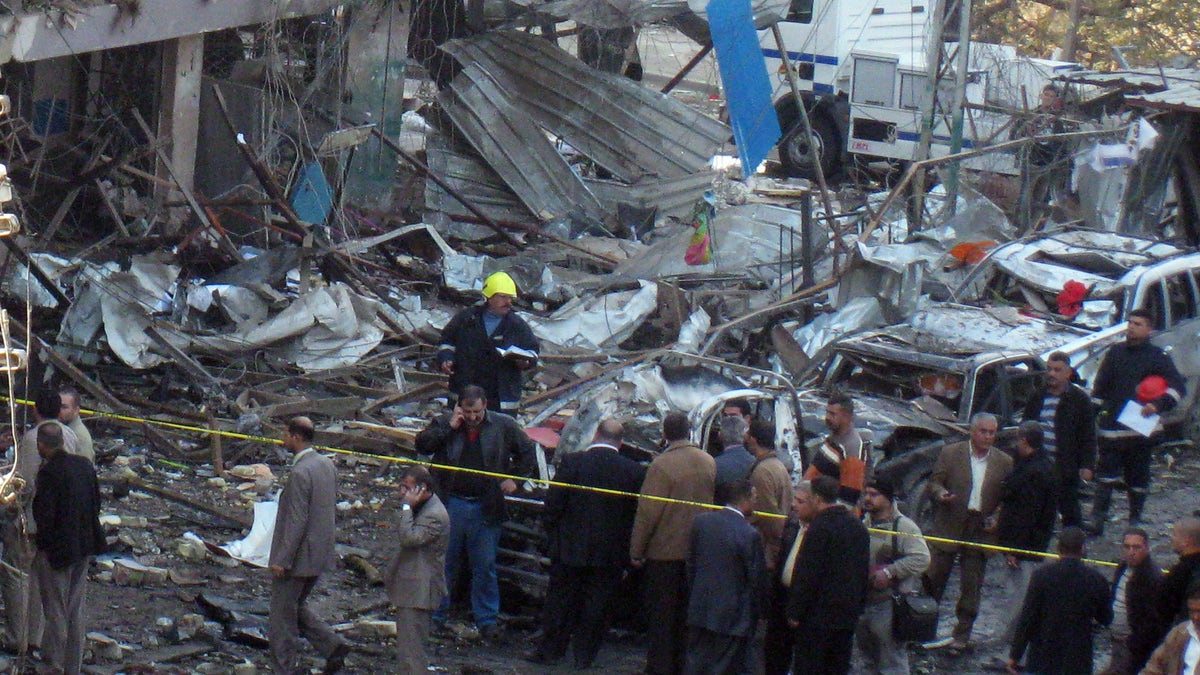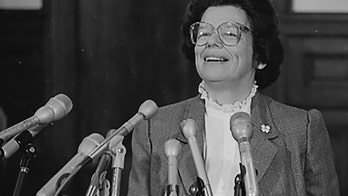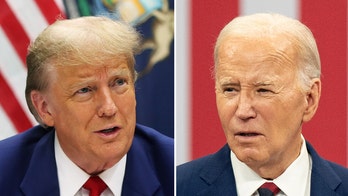
Dec. 22, 2011: Iraqi security forces and people inspect the scene of a car bomb attack in Baghdad, Iraq. A series of blasts Thursday morning in Baghdad killing and wounding scores of people in a coordinated attack designed to wreak havoc across the Iraqi capital. (AP2011)
WASHINGTON – Iraq's troubled start to life without U.S. forces calls into question the Obama administration's assertion that it has wound down America's long war responsibly: at least 78 killed in blasts across the country in a single day last week, a protracted political crisis with no end in sight, top political leaders accusing each other of monstrous criminality.
An extension of the costly and unpopular deployment of American troops to Iraq may have only temporarily suppressed some of the tensions, but the heightened violence and political dysfunction illustrate the unfinished business the United States has left behind in Iraq. Nine years after American proponents of intervention predicted a cakewalk, a welcome mat and Iraqis singing and flying kites in a shining example of democracy for the Arab world, the U.S. is still struggling to finish the job.
It is unclear how much more help Iraq wants, either. Last month's send-off of the last U.S. soldiers was inauspiciously followed by Shiite Prime Minister Nouri al-Maliki ordering an arrest warrant for the country's highest-ranking Sunni official, threatening to exclude the rival sect's main political party from his government and warning of "rivers of blood" if Sunnis sought an autonomous region.
The Obama administration is defending the military withdrawal from Iraq, after the two countries were unable to agree on whether American troops should be granted legal immunity. Defense Secretary Leon Panetta said in an interview aired Sunday that "periodic acts of violence" in Iraq, like those seen recently, are not new and that the thousands of U.S. civilians working there can be safe under Iraqi protection.
"We're confident that we have an Iraqi government and an Iraqi security force that is capable of dealing with the security threats that are there now," Panetta told CBS "Face the Nation."
But President Barack Obama's decision is being attacked by critics during an election year.
"In all due respect, Iraq is unraveling. It's unraveling because we did not keep residual forces there," said Arizona Sen. John McCain, the ranking Republican on the Senate Armed Services Committee. McCain also spoke on CBS.
Leading U.S. efforts, the State Department got $6.2 billion in Iraq funds for the year. Some $3.8 billion is for the department's operations, including for the deployment of several hundred diplomats, civil service experts and specialists in fields from agriculture and commerce to health and education. Hundreds more are needed for management, logistics and security support in a land still wracked by violence. Thousands of security contractors are also being employed. The Defense Department got an additional $11 billion to wrap up military operations and fund a leftover contingent of advisers and officials.
The total is a small amount against the backdrop of $1.3 trillion spent on Afghanistan and Iraq over the past decade. Yet it belies any notion that the U.S. and Iraq can easily -- or cheaply -- "normalize" a relationship that has more often than not been nonexistent over the past four decades.
In Baghdad, the Vatican-sized American Embassy stands like a city within a city, a reminder of the previous administration's ambitious vision of an ironclad U.S.-Iraqi alliance based on shared interests, peace and democracy. By far the biggest such U.S. outpost overseas and costing several hundred million dollars, the danger is it ends up being a symbol of U.S. isolation, its diplomats ensconced safely inside but unable to influence events beyond the fortress walls.
The Obama administration has maintained some of the optimistic Bush-era rhetoric for its vision of the future, while acknowledging that much depends on solving Iraq's immediate problems. When al-Maliki teamed up with Muqtada al-Sadr's hardline Shiite supporters, it guaranteed him the prime minister's office. The U.S. secured a role for Ayad Allawi's Sunni-led bloc after it won the most parliamentary seats, but key decisions on the legislation for the power-sharing arrangement were pushed off. Iraq's Defense and Interior ministries were similarly left for later. Now is later.
One legacy of the occupation that costs money to maintain but could be a key diplomatic tool is the distribution of American diplomats throughout the country. Instead of having all U.S. personnel pooled in the capital, and all its engagement efforts directed solely toward the prime minister and other central government leaders, Washington can simultaneously press the Kurds in the North and Sunnis and Shia at the regional level. While Vice President Joe Biden mobilizes his years of personal relationship with Iraq's political elite at the very top, officials staff consulates in Basra, Irbil and, since Christmas, Kirkuk.
The administration wants to begin lowering costs in Iraq further. The plan envisions local staff replacing Americans in security and logistics, and more food and fuel purchased on local markets. The shift would depend on a more peaceful environment prevailing and the country embarking on a surer democratic path.
But the challenge remains: Can the U.S., with its limited capacity to shape events in Iraq, help forge a culture of nation in a place that may remain too deeply divided among themselves? Al-Maliki's arrest warrant against Sunni Vice President and longtime critic Tariq al-Hashemi for allegedly organizing assassinations leaves the country divided at the upper echelons of government. If the schism reaches down to street level, Iraq risks sliding back toward the civil war-like violence of 2006 and 2007.
Administration officials acknowledge that Iraq is mired in its worst government crisis since Saddam Hussein's 2003 ouster, with no obvious answers for a political landscape crisscrossed by long-standing sectarian and regional rivalries, and newer schisms borne out of political maneuvering. The task is Iraq's now, they insist, with the U.S. only assisting. The main effort right now is focused on pressing Iraq's factional leaders into a meeting of the blocs, but even that first tentative step toward a possible breakthrough remains out of reach.
Getting each party to share in the dibs of power remains the conundrum. Almost two years after Iraq's last elections, and a year since the U.S. helped cobble together a government led by al-Maliki's Shiites and including a Sunni-backed bloc, the parties have yet to agree on who will lead the powerful police and military ministries. America may still wield influence, but it is waning.
For weeks, Washington has pushed hard behind the scenes to bring all sides back to negotiations and salvage Iraq's unity government. The U.S. feeling is that most political parties, unsure of how to solve their crisis themselves, still want America's counsel. Officials say leaders in Iraq know the U.S. remains the country's gateway to a world beyond Iran, and much needed international trade, investment and political support.
But without even a semblance of boots and guns on the ground, the stark truth that Washington hasn't been calling the shots for a while in Iraq has become even more apparent. American advice clearly wasn't heeded as Iraq's stability deteriorated after the U.S. forces departed on Dec. 18.
The administration isn't giving up hope and, frankly it says, it can't: partnership with an instable and democratically imperfect but oil-rich nation on Iran's doorstep is too valuable to abandon. However, getting there isn't cheap. A sense of responsibility also pervades, after a U.S.-led military intervention that sparked fierce internecine warfare and a deadly stream of terror attacks that has yet to be eliminated.
Thursday's bombings, presumably by al-Qaida, are a case in point. State Department spokeswoman Victoria Nuland on Thursday called them "desperate attempts by the same kind of folk who have been active in Iraq, trying to turn back the clock." On the government impasse, she said American officials from Biden on down were actively "trying to support the Iraqis in settling their disputes peacefully through political means."
The doubts over Iraq are prompting more in Iraq and the U.S. to question whether there will be a time when Washington asks itself why it is bothering with a huge diplomatic outreach, especially if Iraq's splintered leadership isn't interested in listening. Some analysts are looking for more realistic, if narrower, U.S. goals and a clearer strategy to achieve them.
"The question now is whether Iraq is going to be a place for stability or instability, will it be a place where bad guys can do bad things, or a place with 30 million people and huge resources that is secure in its borders and helps stabilize the region," said Jon Alterman, Middle East director at the Center for Strategic and International Studies in Washington. "We don't know the answer yet."




